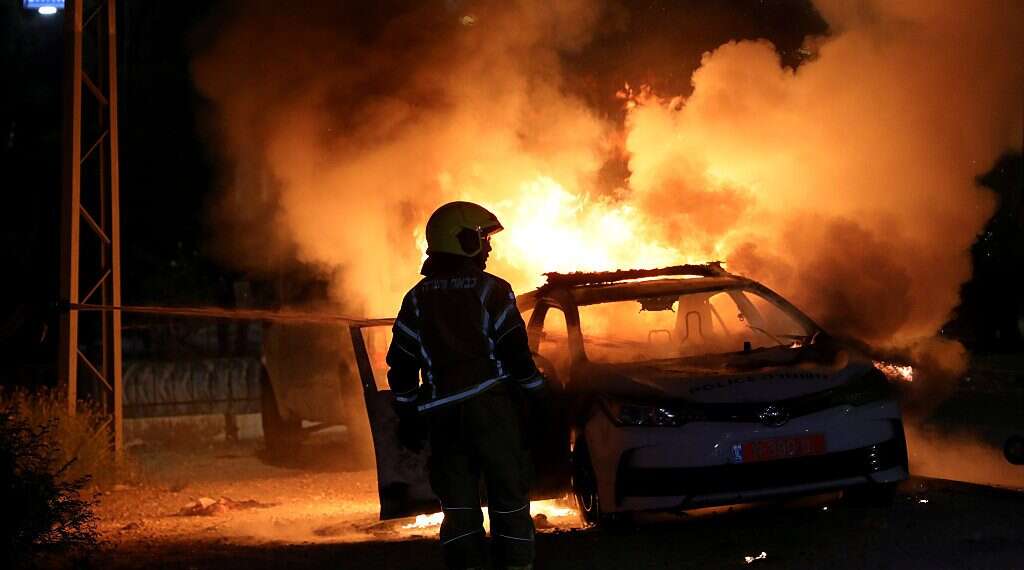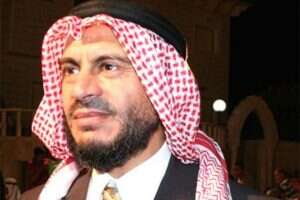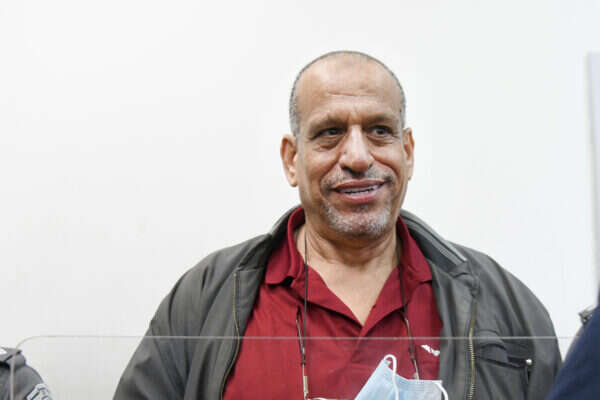by Nadav Shragai
Six years after Israel outlawed the Northern Branch of the Islamic Movement, it's finding a backdoor in and once again stirring up violence in the form of unrest in mixed cities.
 |
| An Israeli firefighter stands near a burning Israeli police car during clashes between Israeli police and Arab Israeli residents of Lod on May 12, 2021 | File photo: Reuters/Ammar Awad |
The Northern Branch of the Islamic Movement and its two sub-branches, the Murabitun and the Murabitat, were outlawed in Israel in 2015. The 17 non-profit organizations and institutions nationwide that were connected to the Northern Branch – located in, among other places, Umm al-Fahm, Jaffa, and Rahat – closed and their bank accounts were frozen. Security officials presented the political echelon with supposed proof that the Northern Branch and its satellites had become an arm of Hamas, a dangerous one that was busy with incitement, and even causing marginal harm.
But now, the Northern Branch of the Islamic Movement has found a back way in. Absurdly, the people helping it are its rivals, members of the Southern Branch of the Islamic Movement, currently represented in the governing coalition by the Ra'am Party. For years, the "southerners" maintained contact with their outlawed colleagues. Now, following a spate of rioting in mixed Jewish/Arab cities, and investigations into and arrests of many members of the Northern Branch and its leaders, the Southern Branch is giving them public backing.
For a long time, the two branches – with have their roots in the Muslim Brotherhood movement – shared an ideology: the establishment of a Muslim society under Sharia law and an Islamic government under a caliphate. But they espoused different paths to that goal. The Northern Branch saw the state of Israel as an illegitimate entity, undermined it, and boycotted its institutions, while the Southern Branch wanted to integrate into the country and its institutions – and now the government and the coalition, and promote the local interests of Arab Israelis.
Now the two branches are moving closer to each other, with encouragement from Turkey, Qatar, and Hamas, which Ra'am leader Mansour Abbas said last week in an interview to the daily paper Al-Quds al-Arabi did not intervene in his movement's affairs.
To understand the significance of the warming relations between the two branches and why it pleases Hamas, we need to go back seven years, when the Northern Branch and its leaders were inciting terrorism and violence. They also had ties to Hamas. The Murabitun, the men who defend Muslim holy sites, and the Murabitat, the women who do the save, became the Northern Branch's satellites on the Temple Mount. They had a defined role: To block and interfere with Jewish visits to the Mount, sometimes by shouting and sometimes by violence.
From time to time, this activity inspired terrorist attacks against Jewish visitors. A system was also put in place to bus half a million Arab Israeli visitors to Al-Aqsa. At one point, the Murabitun and Murabitat planned to rent hotel rooms in Jerusalem to accommodate their people from the Galilee and the Triangle region of northern Israel, ensuring a constant supply of personnel to keep up the rioting at the Temple Mount. The wave of "lone wolf terrorism" that extended from 2014-2017 took inspiration from the Northern Branch and its two satellites, which were funded by Turkish money that carried a strong whiff of Hamas.
Back then, it took five cabinet meetings to make the decision to outlaw the Northern Branch of the Islamic Movement. The Shin Bet security agency and the Israel Police presented opposing positions. Then-head of the Shin Bet Yoram Cohen noted that there was no sense in outlawing a movement that boasted a "hardcore" membership of some 10,000. Cohen suggested taking targeted action against any operatives who could be proven to be committing crimes, and bringing them to justice. Then-Public Security Minister Gilad Erdan and Defense Minister Moshe Ya'alon told their fellow ministers that members of the Northern Branch needed to be removed from Jerusalem, its Old City, and the Temple Mount, and the best way to do that was to outlaw the movement itself. Then-Prime Minister Benjamin Netanyahu was convinced. Most of the cabinet ministers voted with him.
A clear division of labor
Six years later, it's hard to tell the difference between the activity in Jerusalem of the Northern Branch-Hamas and that of the Southern Branch of the Islamic Movement. Then and now, the ideological and sometimes financial umbrella is supplied by Turkey and Qatar. The unofficial division of labor between Hamas and the two branches of the Islamic Movement is clear – both the Northern and Southern branches are taking the "dawa" approach of disseminating ideology and winning hearts and minds through education. This is being done through vast amounts of money that goes to fund summer camps, educational institutions, loans, and various civil needs, not to mention refurbishing mosques.
The military leg, Hamas, tries from time to time to carry out terrorist attacks. In the first five months of 2021, over 50 such attacks were thwarted. Hamas has also not given up on the new equation it's trying to create in Jerusalem: quiet in the south in exchange for "successes" in "Al-Quds." In its negotiations with Israel, Hamas is still demanding that Israel freeze Jewish settlement in the Shimon HaTzadik (Sheikh Jarrah) neighborhood, where Jews come under attack on a nightly basis, and put a stop to Jewish visits to the Temple Mount.
A video put out by the Southern Branch portrays Jewish worshippers being ousted by an Arab crowd that roars, "Through spirit and blood we will redeem Palestine," while switching a Hebrew sign that reads "Jerusalem" for an Arabic one that says "Al-Quds." Madeline Issa, one of the best-known Murabitat activists from the Southern Branch, who has been ordered to keep away from the Temple Mount a few times after harassing Jewish visitors there, has become a source of pride for the movement's leaders. Mansour Abbas even issued her a commendation. The Southern Branch – or more accurately, its Al Aqsa Foundation – has taken over responsibility for bussing Arab Israelis to the Mount, which the Northern Branch used to do.
Meanwhile, operatives from both branches board the buses. While protests were taking place daily at Damascus Gate leading up to Operation Guardian of the Walls, many of the participants who arrived in the city were from the Northern Branch. At other times, Southern Branch members have been more prominent. Only last week, Sheikh Hamad Abu Dabas, head of the Southern Movement, headed a delegation that visited deputy leader Sheikh Kamel Khatib, who is under indictment for allegedly inciting to terrorism and who even praised Arab rioters who murdered Jews in the riots of 1929. Abu Dabas, who also serves as head of the Shura Council, which allowed Mansour Abbas and Ra'am to join the Bennett-Lapid government, congratulated Khatib on his release from jail and called for unity and solidarity among members of the Islamic Movement in Israel.

The two branches also cooperated on an event in memory of Mohammed Morsi, the late Egyptian president and Muslim Brotherhood member, who helped Hamas in Gaza. According to a tweet by Michael Milshtein, head of the Palestinian Studies Forum at the Moshe Dayan Center for Middle Eastern and African Studies at Tel-Aviv University, the event took place in the village Arara under the title "From Wounded Palestine to Captive Egypt."
'The entity that will collapse'
The two senior religious leaders who were behind the incitement during the rioting against Jews in Lod and Acre and who are identified with the outlawed Northern Branch are the imam of the Grand Mosque in Lod, Sheikh Yusuf Al-Baz and imam of El-Ramal Mosque in Acre, Sheikh Mahmoud Madi. Al-Baz, the better-known, has already described Israel as an enemy state and said that Hamas' fighters are a symbol for him. He has also blessed terrorists, supported a civil uprising against the state which "is not the state of the Arabs of Israel," and recently shared on Facebook a violent movie scene in which a man is stopped by two traffic cops and murders them brutally. Alongside the video, Al-Baz wrote: "The best way to handle injustice."
Al-Baz also hosted in Lod the former mufti of Jerusalem, Sheikh Ikrama Sabri, a man aligned with Turkish President Recep Tayyip Erdogan, Hamas, and the Northern Branch in east Jerusalem. Sabri arrived in Lod to express his identification with and strengthen Lod's Arab residents, and warned that "there is a need to battle Judaization of neighborhoods and theft of the Muslims' civilization."
His less well-known colleague from Acre, Madi, called the rioters arrested "our youth who are battling the enemy," and in the spirit of the Hamas directive, talked at length about the need to take part in the battle for Al-Aqsa and Sheikh Jarrah. Madi, like Al-Baz, thinks that Arabs should boycott Israeli elections, does not recognize the "Zionist entity," but he does support coexistence in Acre. He thinks that Israel's repeated elections indicate a rift in the Zionist entity, which is confused and destined to collapse.
Israeli security officials think that both sheikhs contributed to the recent wave of rioting in which Jews in Lod and Acre came under attack by local Arabs, but also note that members of the Southern Movement, who might feel a sense of competition with the Northern Branch, are not keeping their fingers out of the pie. Mansour Abbas visits a protest tent set up after Khatib was arrested.
The Southern Branch, through its Al-Aqsa Foundation, recently called on the public to donate hundreds of thousands of shekels to pay a fine handed out for illegal construction in Beit Zafafa and Jerusalem that would prevent the homes from being demolished. The Southern Branch has paid fines for Sheikh Abdul Azim Salhab, head of the Waqf's donations council, which he incurred for violating COVID restrictions. The Southern Branch not only organizes transportation to the Temple Mount, but also busses Arabs from all over Israel into Acre to help Arab business owners recover after Jews stopped buying from them due to the rioting.
The Southern Branch has even set up a foundation to provide legal counsel to Arabs under arrest for rioting. Mohammad Mahmid, chairman of the directorship of the Southern Branch in Jaffa, took part in a protest in the city during the riots. Protesters were urged to "liberate Jaffa through spirit and blood." Sheikh Mohammed Salameh Hassan from the village Reineh, one of the leading religious authorities of the Southern Branch, recently wrote that "The people of Palestine are united form the river to the sea until the occupation disappears entirely," and that "until the struggle succeeds … to secure the desired results, action must be taken wisely and reasonably, considering the circumstances, the time, and the arena, and every person must be active in his own way according to his own circumstances, energy, and abilities."
Lt. Col. (res.) Dr. Shaul Bartal of Bar-Ilan University, an expert on Palestinian affairs and Islamic fundamentalism, recently raised the question to what extent Ra'am, which is rooted in the Muslim Brotherhood movement and has a history of battling Zionism and Israel, is willing to forgo its religious and national goals and make due with municipal achievements, especially in light of the inevitable clash between Israel and Hamas, which he called "Ra'am's sister movement."

Money to the 'Arabs inside'
Bartal published an article in which he quoted former MK Ibrahim Sarsour (Ra'am-Ta'al), currently a member of the Shura Council. Sarsour made it clear that Ra'am taking part in the Knesset election did not negate its ideology, according to which control of the land "must be Muslim, under a caliphate." Bartal even noted that the movement's newsletter As-Sirat until recently positive coverage of Hamas along with anti-Israeli and antisemitic remarks.
Another important player who is helping shape the relationship between Israel, Hamas, and the two branches of the Islamic Movement is Qatar. The Qataris, who have moved closer to Egypt in the past few months, have become not only mediators between Israel and Hamas but also a sponsor that is buying Israel quiet by paying Hamas $30 million every month.
The Qatari issue is being reexamined, partly due to an anti-Israel conference Qatar hosted in Doha during the 11-day campaign against Hamas in the Gaza Strip, while the US and Egypt were still trying to broker a ceasefire. The conference, whose content is being published by MEMRI, hosted thousands of participants and witnessed calls in praise of the casualties, jihad, and armed struggle against Israel.
Many people spoke in Doha, including head of Hamas' politburo Ismail Haniyeh. Posters of Hamas bombmaker Yahya Ayyash, who is credited with conceiving the idea of suicide attacks in Israel, were waved. Haniyeh dedicated his speech to "our people who inside the 1948 territory, the ones who defend Al-Aqsa and rise up against the occupation and the settlers," spoke about "The collapse of the theory of coexistence in Lod, Ramle, Rahat, and other places," and praised Qatar's contribution to the Palestinian issue.
For years, Qatar has been pouring money to the people termed in Doha "Arabs on the inside" (Arab Israelis), mostly for civil and community purposes in the spirit of dawa. At first, Qatar did so via the Northern Branch, and in recent years has been investing in various projects promoted by Ra'am and the Southern Branch. Ra'am No. 2 MK Mazen Ghanaim, former mayor of Sakhnin, secured a Qatari donation for the Sakhnin soccer club, and when he was in Qatar he met with former MK Azmi Bishara, who fled Israel after the 2006 Second Lebanon War under suspicion of having aided Hezbollah.
According to one security official who spoke with Israel Hayom, there is a need to keep extremely close tabs on the Turkey-Qatar-Hamas axis as well as the two branches of the Islamic Movement in Israel. The same official said that recently, the ban on the outlawed Northern Branch's activities has not been fully enforced. However, officials from the Southern Branch are facing trial for their part in the rioting in mixed cities. The Southern Branch, the official explained, even took part in the political game and for the first time joined the governing coalition, is still playing both sides and should also be followed closely, but with greater sensitivity than in the past.
The official quoted Mansour Abbas, who said in an interview last week that his movement "has not given up its religious, national, or civil principles at all."
As far as Turkey and Qatar's involvement with the two branches of the Islamic Movement goes, the official said that "this is a matter for the political echelon" to decide, while the question of the ties between Hamas and the Islamic Movement's branches in Israel he sees as based in ideology and identity, and less of a practical nature, such as the ones that used to exist between Hamas and the Northern Branch.
Nadav Shragai
Source: https://www.israelhayom.com/2021/07/07/outside-the-law-inside-israel/
No comments:
Post a Comment